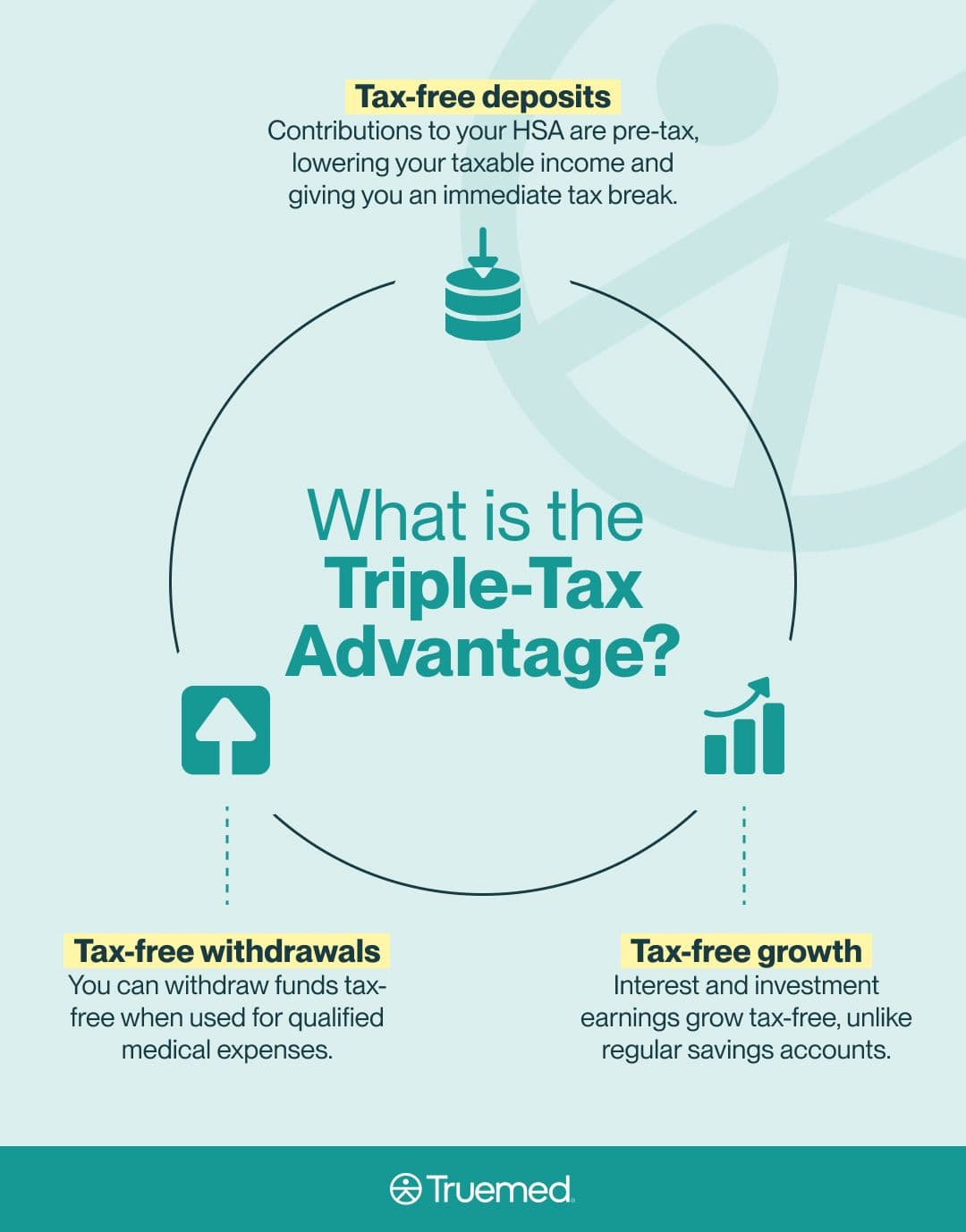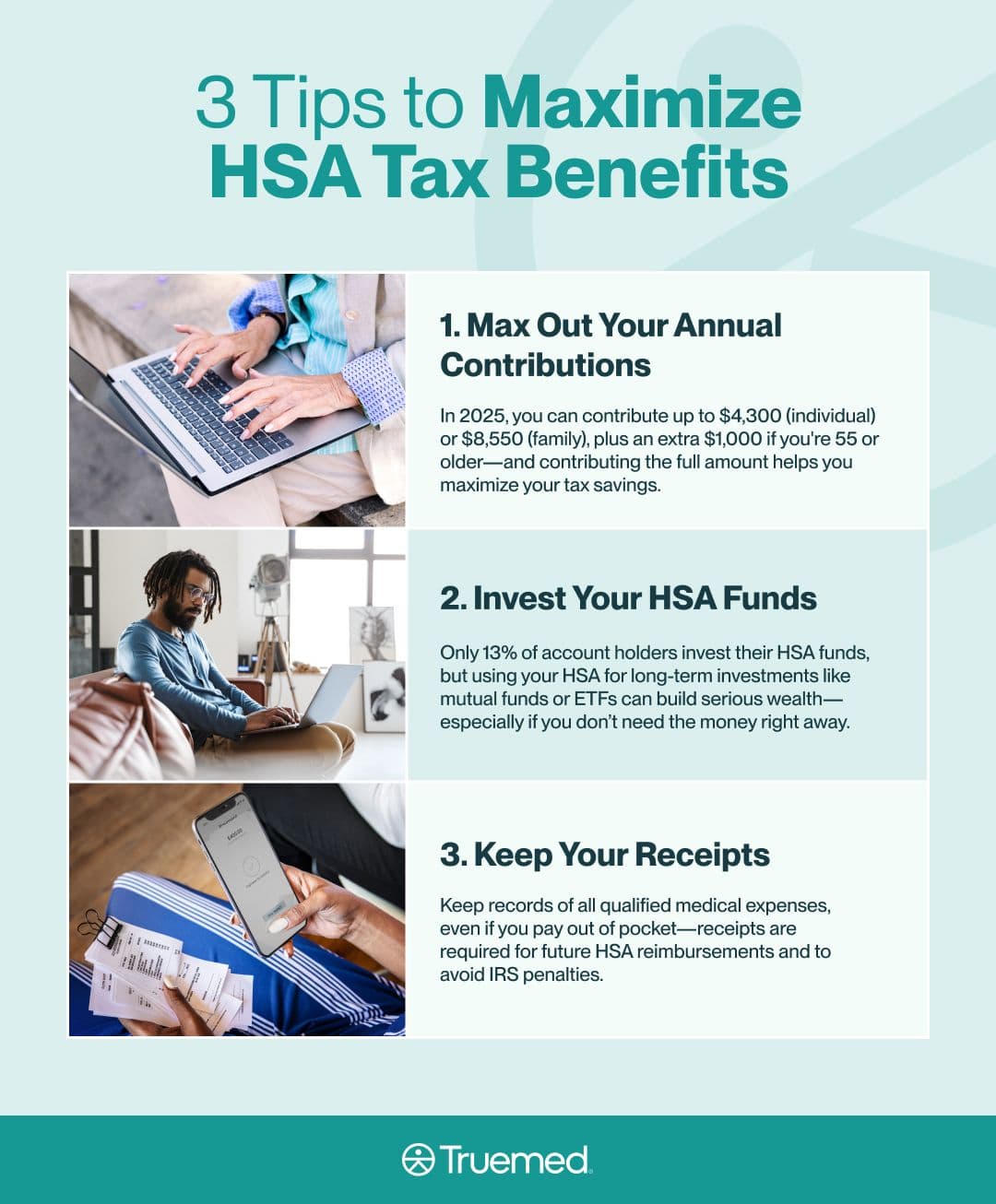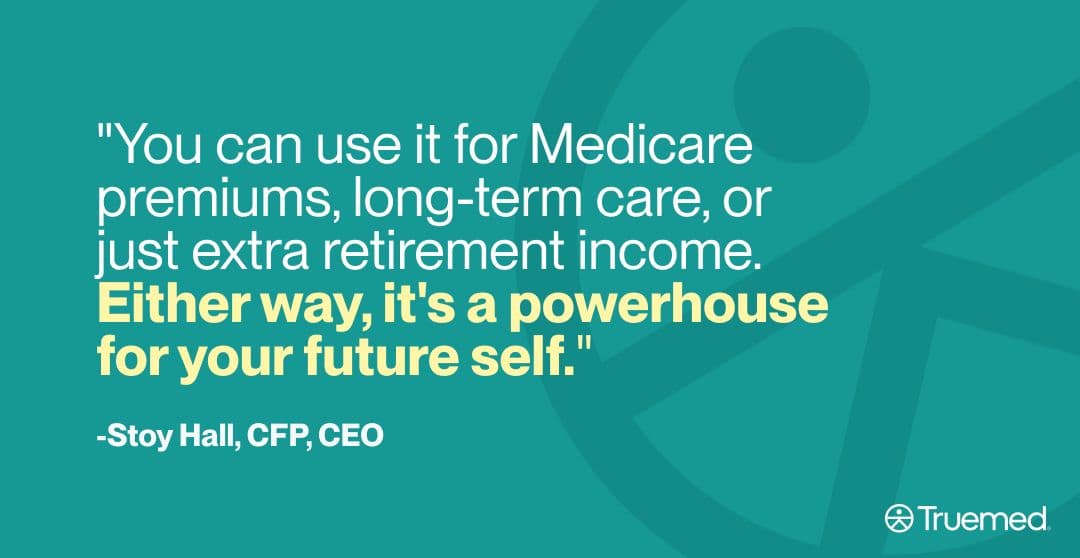HSA Tax Benefits: How to Maximize Your Money
Author:Mia Taylor
Reviewed By:Michaela Robbins, DNP
Published:
July 22, 2025

HSA Tax Benefits: How to Maximize Your Money
Nobody likes paying taxes, but at least there are ways to reduce your annual debt to Uncle Sam. Health Savings Accounts (HSAs) are one such option. These accounts, available to individuals enrolled in high-deductible Health insurance plans, come with a variety of tax benefits that can help you reduce your annual tax bill while also allowing you to amass a pool of pre-tax money that can be used for health expenses. And when used wisely, an HSA can also supercharge your financial portfolio.
Health Savings Accounts (HSAs) are one of the most misunderstood and underutilized tax-advantaged investment accounts available to Americans. These accounts, which are available to individuals enrolled in high-deductible health insurance plans, allow for setting aside pre-tax money that can later be withdrawn to cover eligible medical expenses — everything from copayments to coinsurance costs, lifestyle interventions, and more.
The ability to save money in an HSA to cover medical expenses is merely one of these accounts’ cool features. HSAs also come with a trio of very valuable tax benefits that, when used effectively, can not only help you save significantly on healthcare costs, but will also help you optimize your overall financial health. This guide will cover the tax advantages offered by HSA accounts and how best to use them so that you can maximize the power of HSA accounts as a key tool for saving on health expenses.
Understanding the Triple-Tax Advantage
Perhaps the most powerful features of an HSA account are the trio of tax benefits they offer:
- Tax-free deposits
- Tax-free growth
- Tax-free withdrawals
Often referred to as the “triple-tax advantage” of HSAs, these benefits, when combined with other account features, make HSAs an extremely valuable tool in your overall financial planning efforts—including saving for retirement or creating a nest egg.
"HSAs are considered an effective vehicle for saving on healthcare costs while building long-term wealth because they offer tax advantages in three main ways," says Steve Sexton, founder of Sexton Advisory Group, a financial planning firm specializing in wealth management, including tax planning and retirement planning.

"In addition to [allowing] tax-deductible contributions, any interest or investment earnings in your HSA are not taxed—allowing the funds in your HSA to grow faster than other savings vehicles that do tax earnings, such as a regular savings account," explains Sexton. "Lastly, you’re also able to withdraw money from your HSA to fund qualified medical expenses without paying taxes on the withdrawals."
Let's take a closer look at each of these benefits.
Tax-Deductible Contributions
For individuals who make deposits to an HSA account on their own—in other words, not through an employer-sponsored account via payroll deductions—all contributions are tax deductible when filing your annual tax return, according to tax preparation company H&R Block. Moreover, you can claim the HSA contributions deduction whether or not you itemize on your tax returns.
Contributions made via an employer-sponsored account, on the other hand, are made pre-tax and therefore cannot be claimed as a deduction on your tax return. But that doesn't mean contributions to employer-sponsored accounts are less valuable with regard to tax benefits.
HSA deposits made through an employer are taken from your pre-tax pay, thus lowering your taxable income in each paycheck, giving you an immediate tax break and reducing your overall annual income. As an added bonus, HSA contributions made via payroll deductions are also exempt from Social Security and Medicare taxes.
"If you make an HSA contribution through your payroll at work, you don't directly deduct your HSA contribution amount on your tax return; the deduction has already been 'built in' to the Form W-2 you receive from your employer in that the taxable wages reported in Box 1 of that form have already been reduced by the HSA contributions you made via payroll deductions throughout the year," says Logan Allec, CPA and owner of the tax relief company Choice Tax Relief.
In addition to payroll HSA contributions reducing your taxable income and not being taxed, the contributions your employer makes to an HSA on your behalf (if your employer does this) are also fully exempt from taxes.
But perhaps the most powerful benefit of an HSA is the ability to have pre-tax income available to pay for health and medical expenses. This is a very important feature to understand, as avoiding paying federal taxes on income that can be used for health and medical expenses effectively increases your purchasing power for those expenses.
In other words, when you spend directly from your HSA, money that would have otherwise been deducted from your paycheck for taxes is instead available for health and medical needs.
Tax-Free Growth
In many cases, the money deposited into an HSA can be invested to help your savings grow more quickly and the interest earned from these investments is not subject to taxes, according to the IRS.
"Money inside your HSA can be invested in mutual funds, index funds, ETFs, or even left in a savings account depending on the provider. Any growth—whether interest, dividends, or gains—is completely tax-free if used for qualified medical expenses. It’s kind of like having a Roth IRA for healthcare," explains Ethan Pickner, insurance broker and owner of AZ Health Insurance Brokers.
Tax-Free Withdrawals
The third tax benefit of HSAs is the ability to make tax-free withdrawals. More specifically, withdrawals or distributions from an HSA used to pay for qualified medical expenses are tax-free no matter what your age is at the time of the distribution."You can take money out tax-free at any age as long as it’s for qualified medical expenses. That includes stuff like prescriptions, doctor visits, chiropractic care, dental work, and more. You’re using untaxed dollars and avoiding taxes on the way out—a huge win," says Pickner.
Importantly, if you withdraw money from an HSA for a non-qualified expense, you'll be required to pay income tax on the distribution. What's more, if you're under the age of 65, you'll also pay an additional 20 percent tax as a penalty, according to the IRS.
How to Maximize HSA Tax Benefits
There are several ways to make the most of the valuable tax benefits offered by an HSA, such as:
Maxing Out Your Annual Contribution Limits
The IRS sets an annual contribution limit on HSA deposits. As of 2025, the limit is $4,300 for self-only HSAs and $8,550 for family HSAs. Those age 55 and older are allowed an additional $1,000, which is considered a “catch-up” contribution.
Maxing out your HSA contributions each year allows you to make the most of the opportunity to reduce annual taxable income and save powerful, pre-tax dollars for spending on health and medical needs. However, a report published in 2024 by the Employee Benefit Research Institute (EBRI)revealed that American's HSA contributions remain well below the maximum annual allowance.
In particular, the report reveals that "the average combined [employee and employer] HSA contribution was $926 less than the statutory maximum contribution for individuals and $4,576 less than the statutory maximum contribution for account holders with family coverage."
"If you're able to, contributing the maximum allowable amount to your HSA every year allows you to take full advantage of the tax benefits. Think of it this way: The more money you set aside in an HSA, the more money will go untaxed," says Sexton.
Strategically Investing Your HSA Funds
In addition to not maxing out their HSA contributions, HSA account holders often fail to utilize the valuable investment opportunities that come with these accounts. The report from EBRI points out that "few account holders took advantage of the ability to invest HSA funds, as only 13% of account holders invested in assets other than cash."
The good news is that the proportion of HSA account holders who are investing HSA deposits has been steadily increasing in recent years, according to EBRI. Taking this step is an important part of making the most of the wealth-building opportunities offered by HSAs.
"Many HSA providers let you invest in mutual funds, ETFs, or money market accounts once you reach a threshold [in deposits], often $1,000 to $2,000," says Anna Sergunina, CFP and president and CEO of Main Street Financial Planning, who suggests thinking "of your HSA like a 'medical IRA'—invest for long-term growth, especially if you don’t need to spend the funds right away."
In other words, if you have a substantial timeline before retirement, the funds in your HSA can be invested more aggressively. If your window of time before retirement is shorter, however, consider a more conservative investment approach relying on stable growth options.
Keeping Records and Receipts
As an HSA account-holder, hanging on to receipts from medical expenses is a critical task. Even if you don't plan to immediately use an HSA distribution to pay for the medical expense you incurred, keeping receipts is a valuable step.
"If you're paying out of pocket for qualified expenses and plan to reimburse yourself later, it’s super important to save those receipts," says Pickner. "The IRS allows you to take a reimbursement at any time—but only if you can prove it was a qualified expense. If it ever gets audited, you’ll want clean records to avoid the 20% penalty that comes with non-qualified withdrawals."

Common Misconceptions About HSAs
There continue to be many misconceptions surrounding HSAs, which may be why these types of accounts remain somewhat underutilized. One of the most common sources of confusion related to HSAs is whether contributions are made pre-tax or are tax-deductible.
The answer to this question is both. It depends on the type of HSA account you have. For instance, if you have an employer-sponsored HSA, the contributions are made from your paycheck on a pre-tax basis. That means the money you're contributing is taken from your pay before income taxes are calculated and thus reduces your taxable income.
However, if you make contributions to an HSA account that you've opened on your own, not through an employer, then the amount you contribute to the account each year is eligible to be used as a tax deduction.
Yet another misconception surrounding HSAs is that you could lose any funds that remain in the account unused at year's end. This is not true, and it's a very important point to understand. Any money remaining in an HSA at the end of the year rolls over to the following year, and the year after that, and on and on indefinitely.
"Your HSA funds roll over forever. You don’t lose what you don’t use," says Stoy Hall, CFP, CEO and founder of Black Mammoth, a financial education resource.
Using Your HSA to Boost Retirement Savings
Financial advisors agree across the board that HSAs are a valuable tool that should be added to your retirement savings efforts, offering yet another tax-advantaged account option to squirrel away money for your golden years, in addition to typical retirement vehicles like a 401(k) or an IRA.
"I view my HSA as simply another retirement account. I contribute the maximum every year—just like I do to my IRAs—and I invest my HSA similarly to how I invest my IRA funds," says Allec.
In fact, thanks to their unique tax features as you age, HSAs may even have a slight edge over traditional retirement accounts.
For instance, when you turn 65, you can continue to take tax-free distributions from an HSA to pay for qualifying medical expenses. And here's the added bonus: You can also withdraw funds from an HSA once you turn 65 to pay for non-medical expenses without paying a penalty on the distribution.

"This is the ultimate cheat code," says Hall. "Once you hit age 65, your HSA becomes a hybrid account. Withdrawals are still tax-free for medical expenses. Or they're taxed like a traditional IRA for non-medical uses with no penalty. So, you can use it for Medicare premiums, long-term care, or just extra retirement income. Either way, it's a powerhouse for your future self."
Tips for Getting the Most Out of Your HSA
An important way to unlock the maximum benefit of an HSA is by obtaining what's known as a Letter of Medical Necessity (LMN) for “dual-purpose” healthcare-related items that can have both medical and non-medical uses. An LMN is a document provided by your healthcare provider stating that a particular treatment, product, or even device is necessary for you to treat your particular health condition, even if another person might use the same treatment, product, or device for non-medical purposes. Truemed can help you obtain an LMN in a seamless way, connecting you with licensed medical providers who can review your information and, if approved, issue your LMN in one or two days. Once obtained, you'll be able to shop and pay for the approved expenses directly with your HSA.
Medical expenses that could be covered by HSA funds with an LMN in hand range from specific foods and beverages to vitamins and supplements and gym memberships. Mattresses, fitness memberships and equipment, and even saunas and cold plunges may also be HSA eligible if you obtain an LMN.
Another way to get the most out of your HSA? Don’t sweat—er, spend on—the small stuff. Rather than tapping your HSA account constantly for Tylenol and sunscreen, “don’t touch your HSA for little stuff,” says Hall. Instead, pay out-of-pocket for small things you can afford and let those would-be HSA expenses accumulate in your account. "Then, years later, reimburse yourself [for qualified medical expenses]with your receipts—and boom, it’s a tax-free payout with years of tax-free compounding," says Hall.
Pickner offers similar advice, saying “it’’s a sneaky-good way to let the account grow."
With their triple tax advantage, HSAs are a uniquely valuable savings vehicle, and when used effectively, they can be a key part of your overall financial spending and saving strategy, complementing other forms of retirement savings.
Taking the time to fully understand the ins and outs of HSAs and leverage their use for maximum financial and healthcare benefits is an important effort that will pay off both in the short-term by reducing your taxable income and over the long-term by helping you to be more financially prepared for your retirement years.
HSAs are a powerful tool to maximize your money: They should be part of your overall health spending, financial planning, and retirement savings efforts.
HSAs offer a triple tax advantage: Tax-free deposits, tax-free growth and tax-free withdrawals for eligible expenses.
Max out your annual contributions to an HSA : It's the best way to fully utilize the tax benefits that these accounts offer.
HSA contributions are made pre-tax if : You have an employer-sponsored HSA account and are eligible for a tax deduction, or if you opened an HSA account on your own, outside of what your employer offers.
Unused HSA deposits roll over indefinitely: They do not disappear at year's end.
Editorial Standards
At True Medicine, Inc., we believe better health starts with trusted information. Our mission is to empower readers with accurate and accessible content grounded in peer-reviewed research, expert insight, and clinical guidance to make smarter health decisions. Every article is written or reviewed by qualified professionals and updated regularly to reflect the latest evidence. For more details on our rigorous editorial process, see here.


